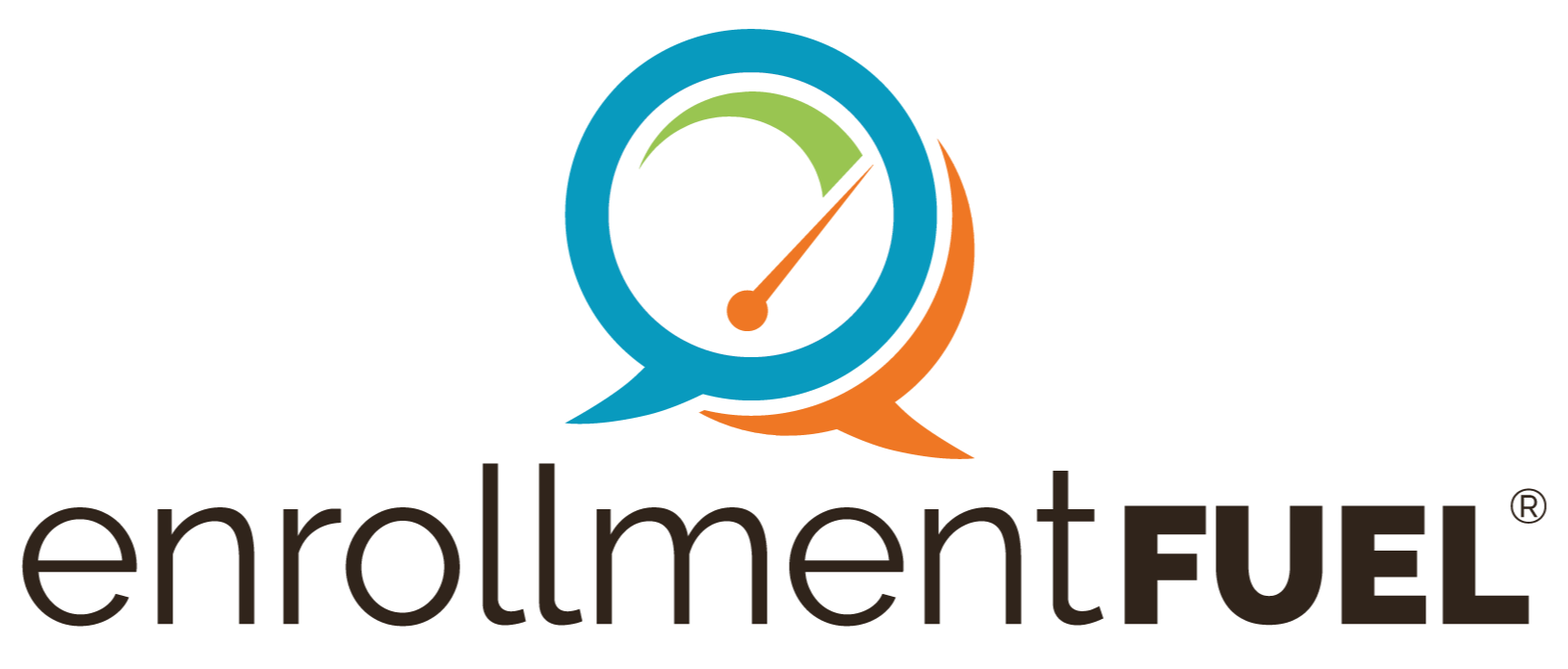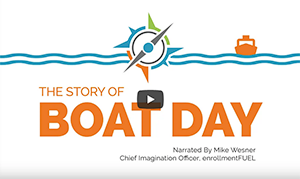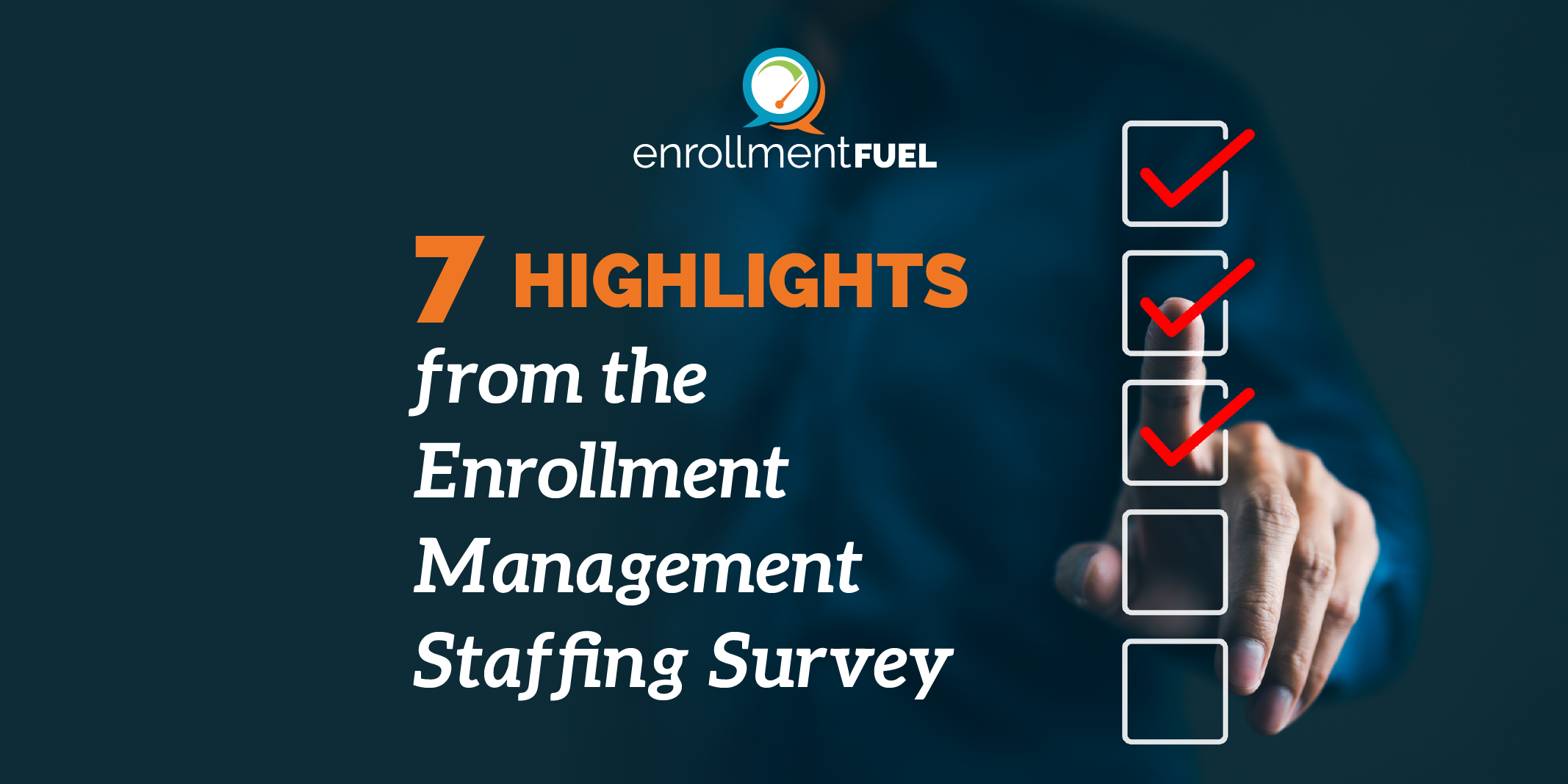5 min read
AI and Admissions: Academic Integrity and Innovation Intersect
If it seems like news about ChatGPT and other AI tools is everywhere, you’re right—not to mention all the speculation about the effect AI will have on academia. At enrollmentFUEL, we want to equip you with the information you need to make the most of these exciting new tools while avoiding their pitfalls.
Using AI and ChatGPT in Higher Education
First, just what are these ai tools?
AI tools use natural language processing models to provide human-sounding responses to queries and prompts. ChatGPT, BARD (Google’s AI), and similar tools use context and natural language processing to create relevant replies. Other tools, like Dall-E 2, use text prompts to create images, audio, or videos.
Amid all the hype and fear about AI’s impact, two questions stand out as especially important for those of us working in enrollment and admission. First, how worried should you be about academic integrity? And second, how can AI tools help make your work easier and more efficient?
AI and Academic Integrity
The headlines about ChatGPT and other AI tools sometimes paint a bleak picture, with stories about students using AI to write essays and people fretting about the end of high school and college English. As enrollment professionals, concerns about students using AI to write admission essays are rising. What happens to academic integrity when it’s increasingly difficult to tell whether a human or a robot wrote what you’re reading?
First, let’s take a step back and put some things in context. A recent Generation Lab poll found that 40% of U.S. college students hadn’t even heard of ChatGPT.1 While it’s impressive that more than half of students had heard of such a new tool, the poll also had some revealing data about how students are using it:
- 71% use ChatGPT primarily for entertainment
- 33% use it to get quick answers to simple questions
- 31% use it to increase their understanding of a complex topic
- Only 17% reported direct knowledge of someone using ChatGPT to cheat
Although there is cause for concern, ChatGPT and other AI tools’ role in cheating on campuses is still small. Additionally, the technology’s limitations—including, at times, basic and obvious factual errors—mean cheating will still be reasonably blatant and easy to spot. Cheating will be harder to catch as the tools improve, but your admission team and faculty members have other strategies at their disposal to identify breaches of academic integrity.
As admission essays start rolling in, your team may encounter AI-written content. The good news is that your institution determines the essay question or prompt you use in the admission process. You can structure the question or prompt so that it elicits responses of a more personal nature, which cannot be generated by AI ( i.e., Share a personal life experience that changed who you are). Remember that the essay is only one part of the suite of tools you use to evaluate a student. Interviews, recorded Q&A sessions, and other strategies might become more important if AI-written essays become problematic.
Concerns about AI and academic integrity aren’t unfounded, although the problem is not as bad as some of the more hyperbolic headlines make it seem. Many fears about the demise of writing will likely prove unfounded.
On the other hand, AI tools show significant promise for increasing efficiency in the admission office.
Using AI to Maximize Efficiency
AI could soon become a trusted partner in the admission office rather than a boogeyman signaling the end of writing as we know it. Here are a few ways to use AI to maximize efficiency in your daily tasks.
Use ChatGPT as a chatbot or virtual assistant.
Due to its conversational nature, ChatGPT is great for answering FAQs and providing website visitors with basic information about your institution. Free up time by handing routine Q&As to an AI chatbot or using AI to schedule meetings and respond to common requests.
Let AI transcribe.
Instead of rushing to capture crucial information in a meeting, set up an AI like Fireflies or Grain to record the session and create a searchable transcription. That way, you can devote your full attention to the conversation and access essential details later. You can also use programs like Descript to edit and transcribe podcast episodes.
Write faster.
AI tools like Shortly AI and Smart Copy are excellent for generating headlines, email subject lines, social media captions, and blog post content. Although AI is no replacement for a human writer, using AI to generate a quick draft can streamline the writing process.
AI-generated content also meets Google’s guidelines, provided you follow a few best practices, like:
- Using the Expertise, Experience, Authoritativeness, and Trustworthiness (EEAT) principle
- Editing and fact-checking (as mentioned above, AI tools don’t get everything right!)
- Performing appropriate, thorough keyword research
- Ensuring backlinks, site structure, and topical authority make sense
Generate stock images.
Dall-E 2, runway, and Lensa AI can create impressive stock photos. Although the tools currently struggle with some details (like human hands and facial expressions), they’re ideal for creating attractive, generic stock photos and illustrations.
KEY TAKEAWAYS
AI will continue to develop and improve. Problematic uses of AI will require creative solutions and new ways of thinking about and teaching writing. However, when properly implemented, AI offers powerful strategies for streamlining tasks and maximizing efficiencies.
1Source: https://www.morningbrew.com/daily/stories/2023/03/05/chatgpt-not-a-hit-on-college-campuses-yet
About the Authors
Laralee Harkleroad serves as enrollmentFUEL’s Associate Vice President of Marketing and Learning. Dr. Harkleroad’s career spans enrollment management, strategic planning, marketing, advancement, and programmatic design. Having navigated myriad facets of higher education, she has led rebranding and institutional identity research efforts refining university visions and missions for nearly fifteen years. Laralee brings first-hand experience in marketing for colleges and universities to schools that need to know exactly where and how to start.
Zana Berisha serves as enrollmentFUEL’s Digital Marketing Specialist. Zana is a graduate of the University of Central Florida with a bachelor’s degree in marketing. She enjoys using her skills to improve our client-partners’ digital marketing experience. She specializes in TikTok and has a passion for learning all things social media. During her time in college, Zana gained a lot of experience and had great success in marketing that led to sales.
Related Articles
Launching Successful Online Academic Programs | enrollmentFUEL
The COVID-19 pandemic drastically reshaped the landscape of higher education. With the rapid...
Using AI in Higher Ed Content Creation | enrollmentFUEL
Mention the term Artificial Intelligence, commonly referred to as AI, to anyone today, and their...




